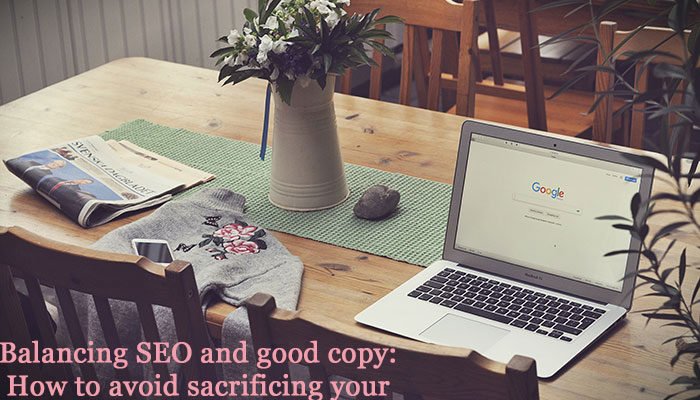Balancing SEO and good copy: how to avoid sacrificing your content for keyword stuffing
- Home
- Articles and Publications
- SEO Tips
- Balancing SEO and good copy: how to avoid sacrificing your content for keyword stuffing
Balancing SEO and good copy: how to avoid sacrificing your content for keyword stuffing
Posted on February 02, 2018
1 Comment
Megan, a very talented copywriter I’ve been lucky to get to know some months ago, shares with us today her considerations about how to balance optimising your content for the specific search intent and keeping it very well written. Don’t forget that poorly written content is quite a bad ranking signal!
***

If you’re a fan of Silvia’s you’ll know about the importance of SEO in getting your website found on the internet, and especially getting Google to rate your web pages.
When you focus on just one thing though, it’s easy to get carried away. Some businesses end up sacrificing the content of their website in favour of shoe-horning in keywords that they think the search engines will like.
The problem is, you can have dozens of keywords but if users don’t like the content they find when they get to your site, they’ll leave quickly.
And that’s the kiss of death for SEO.
The answer is to make sure you have good SEO to get your site found, AND great content to keep your customers engaged once they find you.
Make sure your site has great content that users will stick around and read.
Your content needs to be useful, relevant, and engaging. You can have all the pertinent facts you like but if your copy is clunky to read users will look elsewhere. Competition online is fierce. Your readers know they can always find another site with the answers they’re looking for, and they’re not afraid to leave your webpages and go looking for it. All it takes is one click. You need to get users to stay on your site and spend time there, so that search engines see you as a trusted and valued source.
Research your keywords.
Don’t just try to stuff in every keyword you can think of. Know which ones you’re targeting, use them sparingly and in the right places (for example your title, first few sentences, your subheadings). If you try to put all the possible keywords into your article you won’t leave yourself with space to use any other words! Really, you should be picking one keyword as the focus for each page, and using that alongside semantically-related ones.
Avoid too much repetition of keywords or phrases.
You need to avoid repetition. Repetition should be avoided. I’d recommend you avoid repeating yourself. Repeating yourself is best avoided. It reads weirdly and nobody likes it. Point made.
Don’t just rely on keywords in your copy for SEO.
Done well, SEO draws not only on keywords on your page, but on all sorts of technical settings and behind-the-scenes metadata. I’m not an expert in all that, but I do know you’re unlikely to get good SEO results from using keywords in your writing alone. You need to use the full range of SEO available (including SEO audit of the site itself, use of meta descriptions and URL slugs), rather than going overkill on just one method (on-page keywords).
Avoid the clunk in one easy step. If you do nothing else, do this.
When you add keywords to existing text, or even if you’re writing from scratch with keywords in mind, READ YOUR WRITING BACK TO YOURSELF, preferably out loud. If anything sounds wrong, or if you stumble over anything, change it.

If you can’t read it easily it’s a sure sign that someone else will struggle and most likely give up.
With a little thought, a little balance, and a little help from the professionals, you’ll have a top performing website, complete with excellent SEO, in no time!
About the author
Megan is a tea-drinking writer, and winner (mostly) of the daily battle against some pretty independently-minded hair. She works as Megan Rose Freelance, a Hertfordshire-based copywriter working with small businesses and not-for-profits to help them grow. When she’s not working she can be found tap-dancing, enthusiastically massacring her latest craft hobby or tying herself in knots in front of a yoga video.
One comment
Comments are closed.



Alex Limia Dieguez
06/02/2018 at 8:36 pmThanks so much for sharing – some great tips here. I’m also a copywriter by trade, but still find it can be tricky to tick all the SEO boxes without sacrificing great copy.